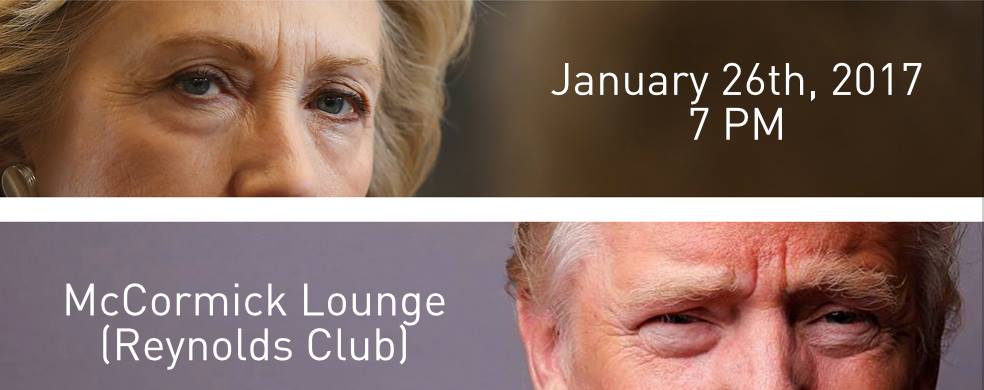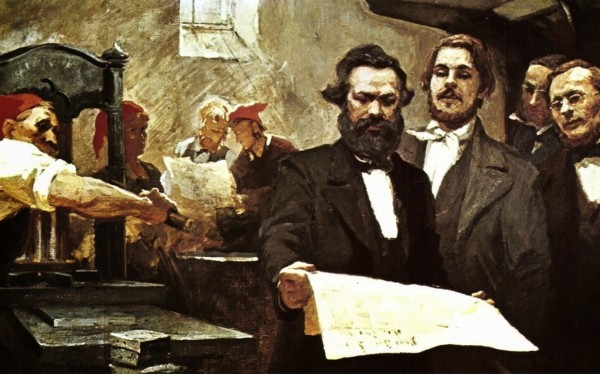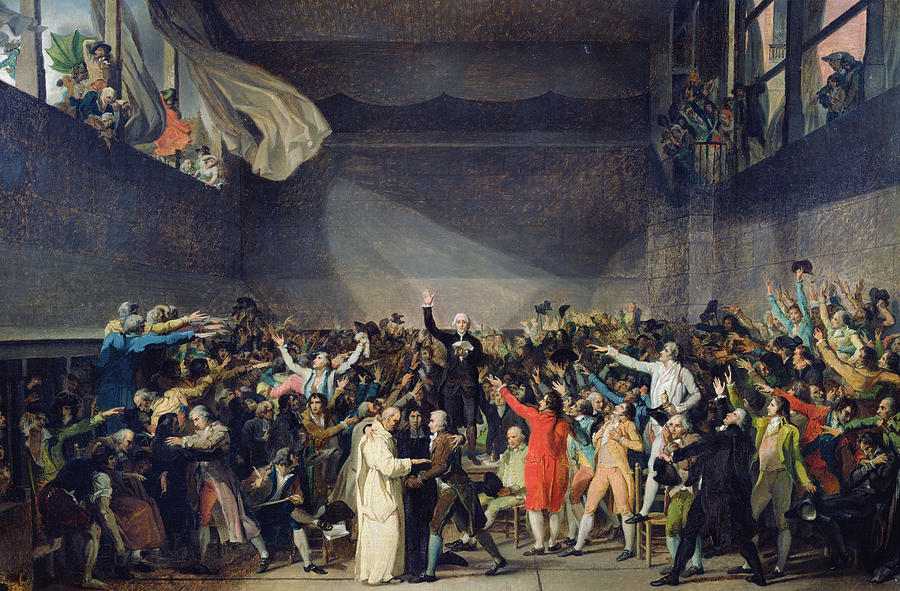
The first meeting will take place on Wednesday, August 9th at 6 PM in Room 517 of SAIC's MacLean Center (112 S Michigan Ave).
All subsequent meetings will take place:
Thursdays 6-9 PM
MacLean Center
112 S Michigan Ave
Room 517
• required / + recommended reading
I. Rousseau: Crossroads of society | Aug. 9, 2017
Whoever dares undertake to establish a people’s institutions must feel himself capable of changing, as it were, human nature, of transforming each individual, who by himself is a complete and solitary whole, into a part of a larger whole, from which, in a sense, the individual receives his life and his being, of substituting a limited and mental existence for the physical and independent existence. He has to take from man his own powers, and give him in exchange alien powers which he cannot employ without the help of other men.
-- Jean-Jacques Rousseau, On the Social Contract (1762)
• Max Horkheimer, "The little man and the philosophy of freedom" (1926–31)
• epigraphs on modern history and freedom by James Miller (on Jean-Jacques Rousseau), Louis Menand (on Edmund Wilson), Karl Marx, on "becoming" (from the Grundrisse, 1857–58), and Peter Preuss (on Nietzsche)
+ Rainer Maria Rilke, "Archaic Torso of Apollo" (1908)
+ Robert Pippin, "On Critical Theory" (2004)
• Jean-Jacques Rousseau, Discourse on the Origin of Inequality (1754) PDFs of preferred translation (5 parts): [1] [2] [3] [4] [5]
• Rousseau, selection from On the Social Contract (1762)
II. Hegel: Freedom in history | Aug. 17, 2017
• G.W.F. Hegel, Introduction to the Philosophy of History (1831) [HTML] [PDF pp. 14-128] [Audiobook]
III. Nietzsche (1): Life in history | Aug. 24, 2017
• Friedrich Nietzsche, On the Use and Abuse of History for Life (1874) [translator's introduction by Peter Preuss]
+ Nietzsche on history chart of terms
IV. Nietzsche (2): Asceticism of moderns | Aug. 31, 2017
+ Human, All Too Human: Nietzsche: Beyond Good and Evil (1999)
• Nietzsche, selection from On Truth and Lie in an Extra-Moral Sense (1873)
• Nietzsche, On the Genealogy of Morals: A Polemic (1887)
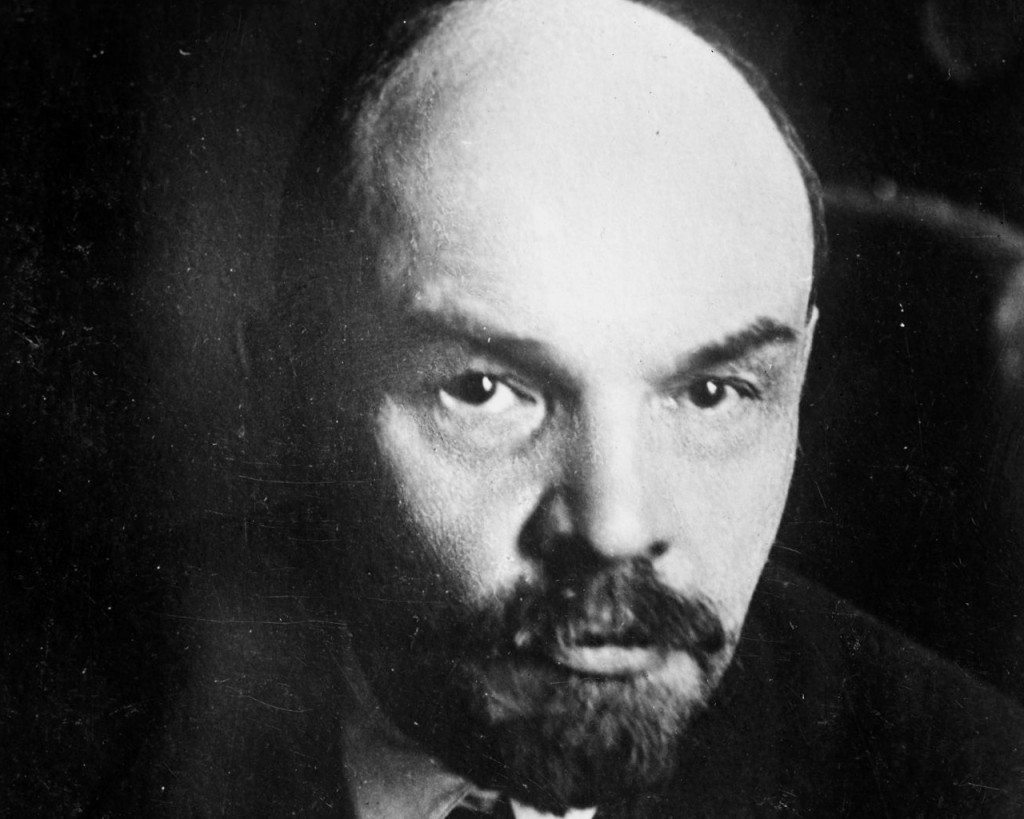
School of the Art Institute at Chicago
Wednesdays from 6-9 PM
Lakeview Building
116 S Michigan Ave, Room 202
• required / + recommended reading
Lenin readings available in Robert C. Tucker, ed., The Lenin Anthology (Norton, 1977), except (*) on marxists.org
Recommended background readings
+ Richard Appignanesi and Oscar Zarate / A&Z, Introducing Lenin and the Russian Revolution / Lenin for Beginners (1977)
+ John Reed, Ten Days that Shook the World (1919)
Week 1 | June 14
• Vladimir Ilyich Lenin, Two Tactics of Social Democracy in the Democratic Revolution (1905), pp. 120-147
• Lenin, On the Two Lines in the Revolution (1915) *
Week 2 | June 21
• Lenin, Lecture on the 1905 Revolution (1917), pp. 278-292
• Lenin, Letters from Afar (1917) *
• Lenin, April Theses (1917), pp. 295-300
Week 3 | June 28
• Lenin, The Dual Power (1917), pp. 301-304
• Lenin, The Enemies of the People (1917), pp. 305-306
• Lenin, The Beginning of Bonapartism (1917), pp. 307-310
Week 4 | July 5
• Lenin, The State and Revolution (1917), pp. 311-398
Week 5 | July 12
• Lenin, Can the Bolsheviks Retain State Power? (1917), pp. 399-406
• Lenin, Marxism and Insurrection (1917), pp. 407-412
• Lenin, Advice of an Onlooker (1917), pp. 413-414
Week 6 | July 19
• Lenin, To the Citizens of Russia! (1917), p. 417
• Lenin, Theses on the Constituent Assembly (1917), pp. 418-422
• Lenin, The Chief Task of Our Day (1918), pp. 433-437
• Lenin, The Immediate Tasks of the Soviet Government (1918), pp. 438-460
Week 7 | July 26
• Lenin, The Proletarian Revolution and the Renegade Kautsky (1918), pp. 461-476
From the Second International to the Frankfurt School
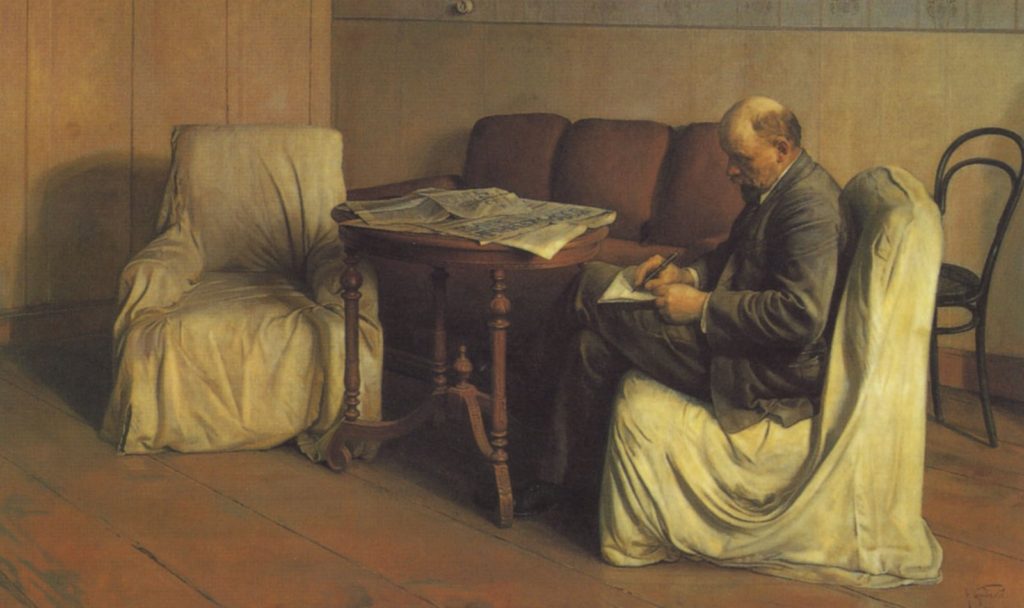
Loyola University
Tuesdays, 7-9:30 PM
6738 N Sheridan Ave
at Starbucks
School of the Art Institute of Chicago (SAIC)
Tuesdays, 6-9 PM
112 S Michigan Ave
MacLean Center, Room TBA
University of Chicago
Tuesdays, 6:30-9 PM
1116 E 59th St
Harper Memorial Library, Room 102
University of Illinois at Chicago
Tuesdays, 6-9 PM
701 S Morgan St
Stevenson Hall, Room 101
- required reading / + recommended reading
Recommended winter break preliminary readings:
+ Leszek Kolakowski, “The concept of the Left” (1968)
+ Richard Appignanesi and Oscar Zarate / A&Z, Introducing Lenin and the Russian Revolution / Lenin for Beginners (1977)
+ Sebastian Haffner, Failure of a Revolution: Germany 1918–19 (1968)
+ Tariq Ali and Phil Evans, Introducing Trotsky and Marxism / Trotsky for Beginners (1980)
+ James Joll, The Second International 1889–1914 (1966)
+ Edmund Wilson, To the Finland Station: A Study in the Writing and Acting of History (1940), Part II. Ch. (1–4,) 5–10, 12–16; Part III. Ch. 1–6
Film screenings: January 2017
- 37 Days(2014) [Episode 1] [Episode 2] [Episode 3]
• Fall of Eagles (1974) episodes: "Absolute Beginners," "The Secret War," and "End Game"
• Rosa Luxemburg (1986)
• Oliver Stone's Untold History of the United States (2012) Episodes A (1900-20) and B (1920-40)
• Reds (1981)
Winter–Spring 2017
- Introduction to revolutionary Marxism
Week 13. Revolutionary leadership | Jan 31, 2017
- Rosa Luxemburg, “The Crisis of German Social Democracy” Part 1 (1915)
- J. P. Nettl, “The German Social Democratic Party 1890–1914 as a Political Model”(1965)
- Cliff Slaughter, “What is Revolutionary Leadership?” (1960)
Week 14. Reform or revolution? | Feb 7, 2017
- Luxemburg, Reform or Revolution?(1900/08)
Week 15. Lenin and the vanguard party | Feb 14, 2017
- Spartacist League, Lenin and the Vanguard Party(1978)
Week 16. What is to be done? | Feb 21, 2017
- V. I. Lenin, What is to be Done?(1902)
+ Richard Appignanesi and Oscar Zarate / A&Z, Introducing Lenin and the Russian Revolution /Lenin for Beginners (1977)
Week 17. Mass strike and social democracy | Feb 28, 2017
- Luxemburg, The Mass Strike, the Political Party and the Trade Unions(1906)
+ Luxemburg, "Blanquism and Social Democracy" (1906)
Week 18. Permanent revolution | Mar 7, 2017
- Leon Trotsky, Results and Prospects(1906)
+ Tariq Ali and Phil Evans, Introducing Trotsky and Marxism /Trotsky for Beginners (1980)
Week 19. State and revolution | Mar 14, 2017
- Lenin, The State and Revolution(1917)
Week 20. Imperialism | Mar 21, 2017
- Lenin, Imperialism, the Highest Stage of Capitalism(1916)
+ Lenin, Socialism and War Ch. 1 The principles of socialism and the War of 1914–15 (1915)
Week 21. Mar 28, 2017 (spring break)
Week 22. Failure of the revolution | Apr 4, 2017
- Luxemburg, “What does the Spartacus League Want?”(1918)
- Luxemburg, “On the Spartacus Programme” (1918)
+ Luxemburg, "German Bolshevism" (AKA "The Socialisation of Society") (1918)
+ Luxemburg, “The Russian Tragedy” (1918)
+ Luxemburg, “Order Reigns in Berlin” (1919)
+ Sebastian Haffner, Failure of a Revolution: Germany 1918–19 (1968)
Week 23. March 31-April 2, 2017 [Platypus International Convention]
Week 24. Retreat after revolution | Apr 18, 2017
- Lenin, “Left-Wing” Communism: An Infantile Disorder(1920)
+ Lenin, "Notes of a Publicist" (1922)
Week 25. Dialectic of reification | Apr 25, 2017
- Lukács, “The Standpoint of the Proletariat”(Part III of “Reification and the Consciousness of the Proletariat,” 1923). Available in three sections from marxists.org: section 1 section 2 section 3
Week 26. Lessons of October | May 2, 2017
- Trotsky, The Lessons of October(1924) [PDF] + Trotsky, "Stalinism and Bolshevism" (1937)
Week 27. Trotskyism | May 9, 2017
- Trotsky, The Death Agony of Capitalism and the Tasks of the Fourth International (1938)
+ Trotsky, "To build communist parties and an international anew" (1933)
+ Trotsky, "Trade unions in the epoch of imperialist decay" (1940)
+ Trotsky, Letter to James Cannon (September 12, 1939)
Week 28. The authoritarian state | May 16, 2017
- Friedrich Pollock, "State Capitalism: Its Possibilities and Limitations"(1941) (note 32 on USSR)
- Max Horkheimer, "The Authoritarian State" (1942)
Week 29. On the concept of history | May 23, 2017
- epigraphs by Louis Menand(on Edmund Wilson) and Peter Preuss(on Nietzsche) on the modern concept of history
+ Charles Baudelaire, from Fusées [Rockets] (1867)
+ Bertolt Brecht, "To posterity" (1939)
+ Walter Benjamin, "To the planetarium" (from One-Way Street, 1928)
+ Benjamin, "Experience and poverty" (1933)
+ Benjamin, Theologico-political fragment (1921/39?) - Benjamin, "On the Concept of History" (AKA "Theses on the Philosophy of History") (1940) [PDF]
- Benjamin, Paralipomena to "On the Concept of History" (1940)
Week 30. Reflections on Marxism | May 30, 2017
- Theodor Adorno, “Reflections on Class Theory”(1942)
- Adorno, “Imaginative Excesses”(1944–47)
+ Adorno, Dedication, "Bequest", "Warning: Not to be Misused" and "Finale", Minima Moralia (1944–47)
+ Horkheimer and Adorno, "Discussion about Theory and Praxis" (AKA "Towards a New Manifesto?") [Deutsch] (1956)
Week 31. Theory and practice | Jun 7, 2017
- Adorno, “Marginalia to Theory and Praxis” (1969)
- Adorno, “Resignation” (1969)
+ Adorno, “On Subject and Object” (1969)
+ Adorno, “Late Capitalism or Industrial Society?” (AKA “Is Marx Obsolete?”) (1968)
+ Esther Leslie, Introduction to the 1969 Adorno-Marcuse correspondence (1999)
+ Adorno and Herbert Marcuse, correspondence on the German New Left (1969)
A Panel Discussion
26 January 2017 at 7 PM
University of Chicago
Reynolds Club (McCormick Lounge)
5706 S University Ave
Chicago IL 60637
Featuring:
Jerry Harris, socialist & activist
Representative from the Red Party (TBD)
and more!
Leftists today lament the strength of neoliberal hegemony. The use of the word “hegemony” underlines the ideological dimension of the neoliberal order. It suggests that mass ideological legitimacy -- and not the triumph of pure force or of back-door machinations -- have made neoliberalism a political possibility. What were the ideological shifts in political and social consciousness that provided the grounds for this neoliberal hegemony? What role did the Left play in this historical transformation of political consciousness? A consideration of the history of the New Left and its specific demands can help partially illuminate these issues.
The New Left pointed to the difference in standards of living between the ‘first’ and ‘third’ worlds and called for greater global equality; it showed how society’s institutions were dominated and led by straight white men and called for greater diversity; and it expressed widespread disenchantment with the key features of Fordism—a bureaucratic labor movement, conformist universities , alienated “company men” under full employment, etc.—and called for a transition away from this administered society. Neoliberalism has delivered on all three counts: there appears to be greater equality between the first and third worlds, greater diversity within society’s institutions, and seemingly more individuality and unpredictability in social life.
Freedom, once a rallying cry of the Left, is now the stated ideology of the neoliberal program of upward redistribution of wealth. Indeed, the past decades have seen stagnating wages and a widening income disparity, even though women, LGBT people, people of color, and others who once faced legally enforced, identity-based social exclusion now appear to be more “free” than they were during the pre-neoliberal period of high Fordism. These two aspects of neoliberalism—its identitarian inclusiveness and its anti-working class agenda—appear to go hand-in-hand. Today, discontentment with the neoliberal order are expressed in terms of identity-based political constituencies, e.g., “women,” “labor,” “the black community”, integrated “democratically” as objects of the state (in the US, primarily through the Democratic Party). This appeal however, remains no less authoritarian for all of its apparent liberalism.
Although the politics of the New Left has achieved a dubious, partial success in the neoliberal era, today we are perhaps further than ever from the goal of global socialism. In its passing from the 1960s and through the 1980s, the New Left became institutionalized into two semi-autonomous camps, the “academic left” and the “activist left” –– the devolution of the ‘Marxist left’ into activist organizations in the 1980s was part of this transformation. While these camps continue to express a discontent with the status quo, they lack the mass appeal and political opportunity of the 1960s. 2016 has manifested the crisis of Neoliberalism in an acute manner with such phenomena as Brexit and the US Elections. In the 2016 U.S. presidential elections, discontent with neoliberalism expressed itself in the dual form of Donald Trump and Bernie Sanders’ candidacies. Trump ultimately emerged as the more successful of the two, challenging the neoliberal consensus of both parties in a way Sanders did not.
How can we make sense of the Left’s failure in our contemporary moment to lead in the crisis of Neoliberalism? How can we make sense of the success of the Right in its absence? How then, in light of this history, can we imagine a future for the Left? How can the Left rise above the expression of frustrated expectations within neoliberalism to generating the kind of theory and political practice required to challenge capitalism?
In the Fall of semester of 2015 we are now meeting at three locations, on three different days of the week!
SATURDAYS | 1 PM - 4 PM
[Beginning in October/2nd session]
University of Chicago (UC)
Room TBD
TUESDAYS | 7 PM - 9:30 PM
Loyola University (LU)
Damen Student Center
1032 W Sheridan Rd
Room 122
WEDNESDAYS | 6 PM - 9 PM
School of the Art Institute (SAIC)
MacClean Center
112 S Michigan Ave
Room 818
Week 1. What is the Left? I. Capital in history | Sept 29 (LU), Sept 30 (SAIC) 2015
• epigraphs on modern history and freedom by Louis Menand (on Marx and Engels) and Karl Marx, on "becoming" (from the Grundrisse, 1857–58)
• Chris Cutrone, "Capital in history" (2008)
+ Capital in history timeline and chart of terms
+ video of Communist University 2011 London presentation
• Cutrone, "The Marxist hypothesis" (2010)
Week 2. What is the Left? II. Bourgeois society | Oct 3 (UC), Oct 6 (LUC), Oct 7 (SAIC) 2015
• Immanuel Kant, "Idea for a universal history from a cosmopolitan point of view" and"What is Enlightenment?" (1784)
• Benjamin Constant, "The liberty of the ancients compared with that of the moderns"(1819)
+ Jean-Jacques Rousseau, Discourse on the origin of inequality (1754)
+ Rousseau, selection from On the social contract (1762)
Week 3. What is the Left? III. Failure of Marxism | Oct 10 (UC), Oct 13 (LU), Oct 14 (SAIC) 2015
• Max Horkheimer, selections from Dämmerung (1926–31)
• Adorno, “Imaginative Excesses” (1944–47)
Week 4. What is the Left? IV. Utopia and critique | Oct 17 (UC), Oct 20 (LU), Oct 21 (SAIC) 2015
• Leszek Kolakowski, “The concept of the Left” (1968)
• Marx, To make the world philosophical (from Marx's dissertation, 1839–41), pp. 9–11
• Marx, For the ruthless criticism of everything existing (letter to Arnold Ruge, September 1843), pp. 12–15
Week 5. What is Marxism? I. Socialism | Oct 24 (UC), Oct 27 (LU), Oct 28 (SAIC) 2015
• Marx, selections from Economic and philosophic manuscripts (1844), pp. 70–101
+ Commodity form chart of terms
• Marx and Friedrich Engels, selections from the Manifesto of the Communist Party(1848), pp. 469-500
• Marx, Address to the Central Committee of the Communist League (1850), pp. 501–511
Week 6. What is Marxism? II. Revolution in 1848 | Oct 31 (UC), Nov 3 (LU), Nov 4 (SAIC) 2015
• Marx, The coming upheaval (from The Poverty of Philosophy, 1847) and Class struggle and mode of production (letter to Weydemeyer, 1852), pp. 218-220
• Engels, The tactics of social democracy (Engels's 1895 introduction to Marx, The Class Struggles in France), pp. 556–573
• Marx, selections from The Class Struggles in France 1848–50 (1850), pp. 586–593
• Marx, selections from The 18th Brumaire of Louis Bonaparte (1852), pp. 594–617
Week 7. What is Marxism? III. Bonapartism | Nov 7 (UC), Nov 10 (LU), Nov 11 (SAIC) 2015
+ Karl Korsch, "The Marxism of the First International" (1924)
• Marx, Inaugural address to the First International (1864), pp. 512–519
• Marx, selections from The Civil War in France (1871, including Engels's 1891 Introduction), pp. 618–652
+ Korsch, Introduction to Marx, Critique of the Gotha Programme (1922)
• Marx, Critique of the Gotha Programme, pp. 525–541
• Marx, Programme of the Parti Ouvrier (1880)
Week 8. What is Marxism? IV. Critique of political economy | Nov 14 (UC), Nov 17 (LU), Nov 20 (SAIC) 2015
+ Commodity form chart of terms
• Marx, selections from the Grundrisse (1857–61), pp. 222–226, 236–244, 247–250, 276–293 ME Reader pp. 276-281
• Marx, Capital Vol. I, Ch. 1 Sec. 4 "The fetishism of commodities" (1867), pp. 319–329
Week 9. What is Marxism? V. Reification | Nov 21 (UC), Nov 24 (LU), Nov 25 (SAIC) 2015
• Georg Lukács, “The phenomenon of reification” (Part I of “Reification and the consciousness of the proletariat,” History and Class Consciousness, 1923)
+ Commodity form chart of terms
Week 10. Nov 28-Dec 1, 2015 U.S. Thanksgiving break
Winter break readings
+ Richard Appignanesi and Oscar Zarate / A&Z, Introducing Lenin and the Russian Revolution / Lenin for Beginners (1977)
+ Sebastian Haffner, Failure of a Revolution: Germany 1918–19 (1968)
+ Edmund Wilson, To the Finland Station: A Study in the Writing and Acting of History(1940), Part II. Ch. (1–4,) 5–10, 12–16; Part III. Ch. 1–6
+ Tariq Ali and Phil Evans, Introducing Trotsky and Marxism / Trotsky for Beginners(1980)
+ James Joll, The Second International 1889–1914 (1966)
Week 11. What is Marxism? VI. Class consciousness | Dec 8 (LU), Dec 9 (SAIC) 2015 / Jan 9 (UC) 2016
• Lukács, Original Preface (1922), “What is Orthodox Marxism?” (1919), “Class Consciousness” (1920), History and Class Consciousness (1923)
+ Marx, Preface to the First German Edition and Afterword to the Second German Edition(1873) of Capital (1867), pp. 294–298, 299–302
Week 12. What is Marxism? VII. Ends of philosophy | Dec 15 (LU), Dec 16 (SAIC) 2015 / Jan 16 (UC) 2016
• Korsch, “Marxism and philosophy” (1923)
+ Marx, To make the world philosophical (from Marx's dissertation, 1839–41), pp. 9–11
+ Marx, For the ruthless criticism of everything existing (letter to Arnold Ruge, September 1843), pp. 12–15
+ Marx, "Theses on Feuerbach" (1845), pp. 143–145

